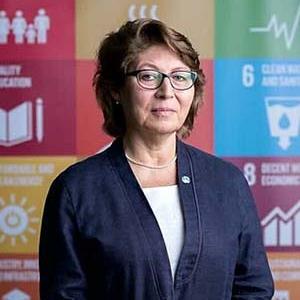Excellencies,
Ladies and gentlemen,
It is a privilege to be here, at the invitation of the organisers of the 1st Baghdad International Water Conference on behalf of SRSG Jeanine Plasschaert, who unfortunately can’t be here today. This is an important conference because water and the potential lack of it is so intimately connected to Iraq’s future prosperity.
Water sustains life, impacts on food sustainability, the environment, the economy and even human security.
The territory of Iraq is famous for its history and civilizations, which were built and thrived on the banks of the Euphrates and the Tigris. Plentiful water resources and the use of extensive waterways and intricate irrigation systems have supported agricultural livelihoods, communities, and large cities for thousands of years.
However, the situation has changed and there is growing evidence of water scarcity across the entire country, such as:
- Decreases in the availability of fresh surface water;
- Increase in country population and individual water consumption;
- Evaporation in dams, water bodies, open irrigation canals, and soils;
- Increase in salinity, desertification and soil erosion;
- and environmental pollution.
The most important drivers of water scarcity are climate change and its effects, namely:
- reduced levels of precipitation on the territory of Iraq and the upstream riparian countries,
- increase in the frequency of droughts,
as well as in the occurrences of sand and dust storms.
While direct human interference, such as:
- decades of inconsistent water management,
- a lack of investments within a conducive policy and legislative framework,
- the building of large dams for irrigation and electricity generation,
- and a lack of water safety awareness of the population are having an additional impact.
This worsening situation has not been helped by the extensive destruction caused by past conflicts and most recently by Daesh that damaged or threatened so much public infrastructure – such as pumping stations, canals, dams and reservoirs.
Against this difficult context, the UN is engaged with the Government on several strands of work covering water, sanitation, hygiene, water resources management, water quality and management of water related disasters. The UN is further responding to humanitarian needs of refugees, IDPs and returnees and other vulnerable citizens as well as helping the government to address structural problems and to facilitate regional dialogue and cooperation on both water and the environment.
In concrete terms, this means improving access to safe drinking water in cities such as Basra; rebuilding irrigation infrastructure; promoting Climate Smart Agriculture with extension offices in the field, and facilitating capacity building within the Ministry of Water Resources and other ministries just to mention a few.
This week, I was present at a Coordination Group for donors and international partners on Agriculture and Water and heard about plans for the formulation of an Agricultural and Water Action and Investment Plan based on the National Development Plan and other recent sectoral and multi-sectoral strategies and the White Paper outlining the main economic reforms necessary. I support such initiatives and anticipate that together we can prioritize the most necessary actions.
I furthermore see much scope for the adoption of modern technology and data collection methods, as any action on water management requires a solid baseline and frequent situational updates.
This international conference is important for Iraq and the region. Water is a shared resource and must be shared at all levels: globally; regionally; between countries; and between men and women at the community level. It must not be a source of conflict but an area of cooperation.
I am pleased to see that Iraq takes a global approach to water and the environment – recognizing the need for sharing and cooperation at the global level to allow resources to be used and shared at the lowest levels. The President’s approval of Iraq’s accession to the Paris Agreement to climate change is an important statement of Iraq’s intent to do more to support renewable energies, to reduce carbon emission and other sources of pollution. This is critical in the context of water as global warming clearly impacts on its future availability. Similarly, I understand that there is an effort to prompt Iraq’s accession to the Convention on the Protection and Use of Transboundary Watercourses and International Lakes (Water Convention). This provides opportunities for advancing transboundary water cooperation, and to foster sustainable development and peace. I commend Iraq’s accession to this and other global conventions.
Water is a fundamental basic need for human survival, such as drinking water and as an input to produce the food we consume. Without water, there would be no life on earth. Water is crucial in order to achieve the United Nations 2030 Agenda for Sustainable Development Goals, not just SDG 6 – ensuring access to water and sanitation for all – but as one of the foundations that connects many, if not all of the SDGs.
As such, reports on water scarcity call for immediate action and I can assure you that the UN family in Iraq – UNAMI and the UN agencies - stand ready to support initiatives that lead to improved water management in Iraq.
Thank you.


